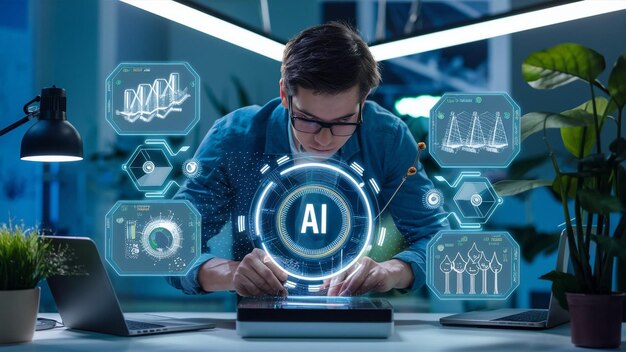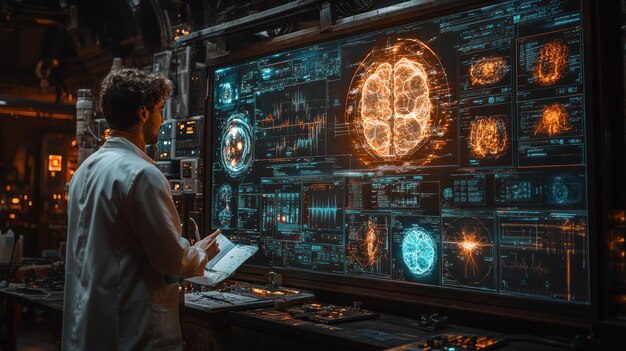AI’s Big Gift to Society: Paving the Way for Automated Content Creation
Artificial Intelligence (AI) has been making headlines lately for its revolutionary impact on various industries. One of the most promising applications of AI is in the realm of content creation. With advancements in natural language processing and machine learning, AI can now generate
text
,
images
,
music
, and even
video content
that rivals human-created counterparts. This development is a game-changer for society in many ways.
Efficiency and Productivity:
Firstly, automated content creation can significantly boost efficiency and productivity. Businesses can save time and resources by having AI generate marketing materials, reports, or social media postsings. This not only frees up human resources for more complex tasks but also ensures a consistent brand voice and tone.
Accessibility:
Moreover, AI content creation can make information more accessible to everyone. For instance, text-to-speech technology can help those with visual impairments or literacy issues by converting written content into spoken word. Similarly, AI translation tools can bridge language barriers and make global communication more seamless.
Creativity:
Despite concerns about replacing humans, AI content creation can also serve as a catalyst for human creativity. Instead of viewing AI as a threat, some artists and writers are exploring collaborative possibilities with AI to create unique and innovative works. These partnerships can lead to new artistic directions and expand the boundaries of what’s possible in content creation.
Challenges:
However, it’s essential to acknowledge the challenges that come with automated content creation. For instance, AI-generated content may lack the emotional depth and nuance of human-created works. Additionally, there are ethical concerns regarding authenticity, accuracy, and potential misinformation that could spread through AI content creation.
Conclusion:
In conclusion, AI’s ability to generate content is a double-edged sword. While it offers numerous benefits such as increased efficiency, accessibility, and potential collaborations between humans and AI, it also presents challenges related to authenticity and ethical considerations. As we continue to explore the possibilities of AI in content creation, it’s crucial to strike a balance between leveraging its benefits while addressing the challenges that come with it.

Revolutionizing Content Creation: The Impact of Artificial Intelligence
Artificial Intelligence (AI), a branch of computer science that focuses on creating intelligent machines capable of performing tasks that would normally require human intelligence, has seen
significant advancements
in recent years. From voice recognition and facial recognition to autonomous vehicles and advanced robotics, AI is increasingly integrated into our daily lives. One of the most intriguing developments in AI is its growing role in
content creation
. Traditionally, content creation has been the exclusive domain of human beings, but AI is now challenging this notion.
Text Generation
AI algorithms can generate text based on given data, allowing for the creation of articles, stories, and even poetry. This is accomplished through various techniques such as Markov models, neural networks, and deep learning. With these tools, AI can create human-like text that mimics conversation or even generates new ideas. This has led to a surge in the production of content across various industries, from journalism and marketing to education and entertainment.
Image and Video Creation
AI is also revolutionizing
image and video creation
. Deep learning models can now generate high-quality images that are indistinguishable from those taken by humans. AI-powered tools can create personalized videos based on user data, enabling targeted marketing and personalized entertainment. This not only saves time and resources but also opens up new opportunities for creativity and innovation.
Impact on Society
As AI continues to advance, it is essential to consider its
impact on society
. While the potential benefits are numerous, there are also concerns regarding job displacement and privacy. As AI becomes more capable of creating content, it may displace human content creators, leading to unemployment and a shift in the labor market. Additionally, there are concerns about the potential misuse of AI-generated content for nefarious purposes, such as spreading false information or creating deepfakes.
Conclusion
In conclusion, AI is revolutionizing content creation, offering numerous benefits and challenges. From generating text to creating images and videos, AI is transforming industries and opening up new opportunities for creativity and innovation. However, it is essential to consider the societal implications of this advancement, ensuring that we harness its potential while mitigating any negative consequences.

The Evolution of AI in Content Creation
Artificial Intelligence (AI) has made remarkable strides in various domains, and content creation is no exception. This section delves into the historical milestones of AI in content creation, focusing on rule-based systems, statistical machine learning, and the current trend of deep learning models.
Historical milestones: From rule-based systems to deep learning models
Rule-based systems (1950s – 2000s): The inception of AI saw the development of rule-based systems, which relied on predefined rules and logic to generate content. These systems were limited as they could only process information based on the rules coded into them.
Statistical machine learning (1990s – present): As the need for more complex content creation arose, statistical machine learning emerged. It used statistical methods to identify patterns in data and make predictions or generate content based on those patterns. This improvement allowed for more nuanced content generation.
Deep learning and neural networks (2010s – present): The recent revolution in AI is attributed to deep learning and neural networks. These models can learn from vast amounts of data, enabling them to identify complex patterns and generate human-like content in various domains.
AI applications in content creation: Text generation, image synthesis, music composition, etc.
Text generation using AI: Natural Language Processing (NLP) and text generation have experienced a surge in development. AI can be used to write articles, generate poetry, and create scripts, thanks to advanced NLP models like GPT-3, BERT, and other language models.
Text generation: Examples
a. Writing articles: AI can write articles by analyzing and understanding existing content, generating new pieces that are similar in style or tone.
b. Generating poetry: AI can create poems by analyzing existing works and generating new lines based on the identified patterns and structures.
c. Creating scripts: AI can write scripts for movies or plays by understanding character development, dialogue, and narrative structure from existing works.
Image synthesis using deep learning algorithms: Generative Adversarial Networks (GANs)
Creating realistic images, art, and logos: Deep learning algorithms like Generative Adversarial Networks (GANs) can create stunningly realistic images, artwork, and logos by synthesizing new data based on existing datasets. These models have revolutionized the way content is generated in the visual domain.
Music composition using machine learning algorithms
Generating new compositions based on existing data: Machine learning algorithms can analyze existing music and generate new compositions that are similar in style, genre, or even mimic specific artists. These AI-generated compositions have shown promise in the music industry and continue to evolve.
